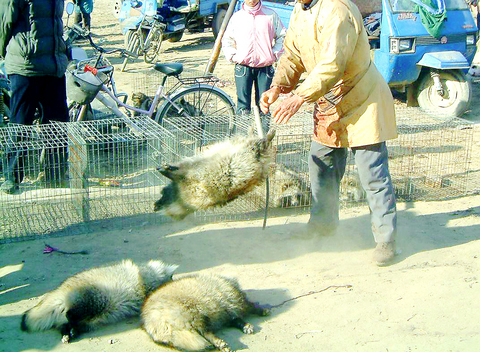China's role as the world's largest exporter of fur garments, with direct links to European and Asian countries, including Taiwan, deserves sharp criticism because of its lack of respect for life, animal rights activists from the Environment and Animal Society of Taiwan (EAST) said yesterday.
EAST released a report on the Chinese fur industry in Taipei yesterday. It is the first ever report from inside China's fur farms and is based on field and desk research carried out last year and last month.
EAST worked in conjunction with groups in Switzerland and the UK, including Swiss Animal Protection, Social Progress for Animal Welfare and Care for the Wild International.

PHOTO: ENVIRONMENT AND ANIMAL SOCIETY OF TAIWAN
At a press conference, video footage taken during researchers' visits to several farms in Hebei Province -- which were raising from 50 to 6,000 animals -- was shown for the first time to the media in Asia.
Animals such as raccoons, foxes, and minks were shown being stunned with repeated blows to the head or by being pounded against the ground. The debilitated animal was then laid on its back or hung upside-down by its hind legs from a hook, and skinning would begin, with a knife inserted in the lower belly.
According to EAST's director, Chen Yu-min (
"We suspect that consumers buying fur products don't know about the brutality involved in the process. Innocent animals suffer for the fashion vanity of humans," Chen said.
According to the report, many animals remained alive after their skin had been stripped off, with breathing, heartbeat, as well as body and eyelid movements all evident for five to 10 minutes.
The report says most Chinese fur farms were established in the past 10 years. Wild species bred for fur include red foxes, Arctic foxes, raccoons, dogs, mink and Rex rabbits.
Wu Hung (
Most animals are killed at about six months old, when they molt for the first time.
Activists said a growing number of international fur traders, processors and fashion designers have gradually shifted business to China, where cheap labor and the absence of restrictive regulations have made it easier to do business and widened profit margins.
Activists said that in the past few years designers have promoted fur in everything from evening wear to sports wear. One fur coat requires the fur of about 80 minks or 25 foxes.
Government statistics in Taiwan suggest that the amount of fur products imported from overseas has increased dramatically, rising from 1,497kg in 2001 to 9,944kg in 2003.
Fur products imported from China, meanwhile, have also increased significantly. In 2003, more than 70 percent of fur products imported were from China. Last year, the percentage rose to 85 percent.
"Why do some consumers in Taiwan, which sits in a sub-tropical area ... need fur products to keep them warm?" Chen said.
Activists said entertainers in show business should take the lead to boycott fur products.
"In China's fur industry, we don't see any spirit to help the weak and aid the needy. Seeing this crime, Taiwan should not become an accomplice," Mary Chen (

An essay competition jointly organized by a local writing society and a publisher affiliated with the Chinese Communist Party (CCP) might have contravened the Act Governing Relations Between the People of the Taiwan Area and the Mainland Area (臺灣地區與大陸地區人民關係條例), the Mainland Affairs Council (MAC) said on Thursday. “In this case, the partner organization is clearly an agency under the CCP’s Fujian Provincial Committee,” MAC Deputy Minister and spokesperson Liang Wen-chieh (梁文傑) said at a news briefing in Taipei. “It also involves bringing Taiwanese students to China with all-expenses-paid arrangements to attend award ceremonies and camps,” Liang said. Those two “characteristics” are typically sufficient

A magnitude 5.9 earthquake that struck about 33km off the coast of Hualien City was the "main shock" in a series of quakes in the area, with aftershocks expected over the next three days, the Central Weather Administration (CWA) said yesterday. Prior to the magnitude 5.9 quake shaking most of Taiwan at 6:53pm yesterday, six other earthquakes stronger than a magnitude of 4, starting with a magnitude 5.5 quake at 6:09pm, occurred in the area. CWA Seismological Center Director Wu Chien-fu (吳健富) confirmed that the quakes were all part of the same series and that the magnitude 5.5 temblor was

The brilliant blue waters, thick foliage and bucolic atmosphere on this seemingly idyllic archipelago deep in the Pacific Ocean belie the key role it now plays in a titanic geopolitical struggle. Palau is again on the front line as China, and the US and its allies prepare their forces in an intensifying contest for control over the Asia-Pacific region. The democratic nation of just 17,000 people hosts US-controlled airstrips and soon-to-be-completed radar installations that the US military describes as “critical” to monitoring vast swathes of water and airspace. It is also a key piece of the second island chain, a string of

The Central Weather Administration has issued a heat alert for southeastern Taiwan, warning of temperatures as high as 36°C today, while alerting some coastal areas of strong winds later in the day. Kaohsiung’s Neimen District (內門) and Pingtung County’s Neipu Township (內埔) are under an orange heat alert, which warns of temperatures as high as 36°C for three consecutive days, the CWA said, citing southwest winds. The heat would also extend to Tainan’s Nansi (楠西) and Yujing (玉井) districts, as well as Pingtung’s Gaoshu (高樹), Yanpu (鹽埔) and Majia (瑪家) townships, it said, forecasting highs of up to 36°C in those areas